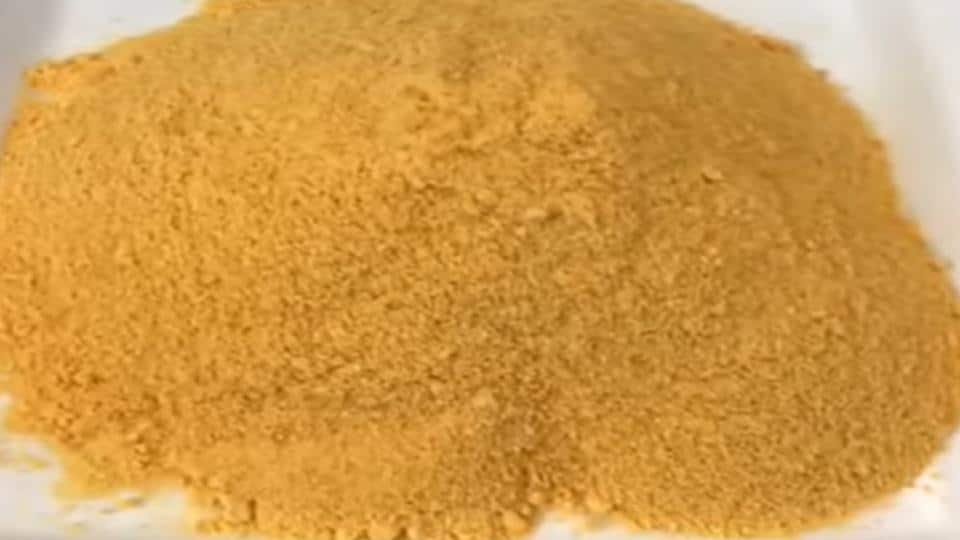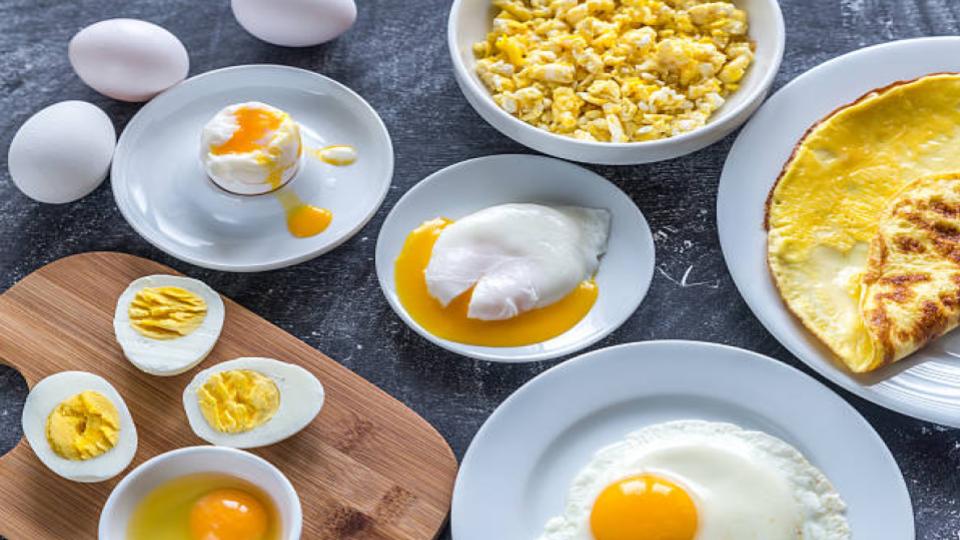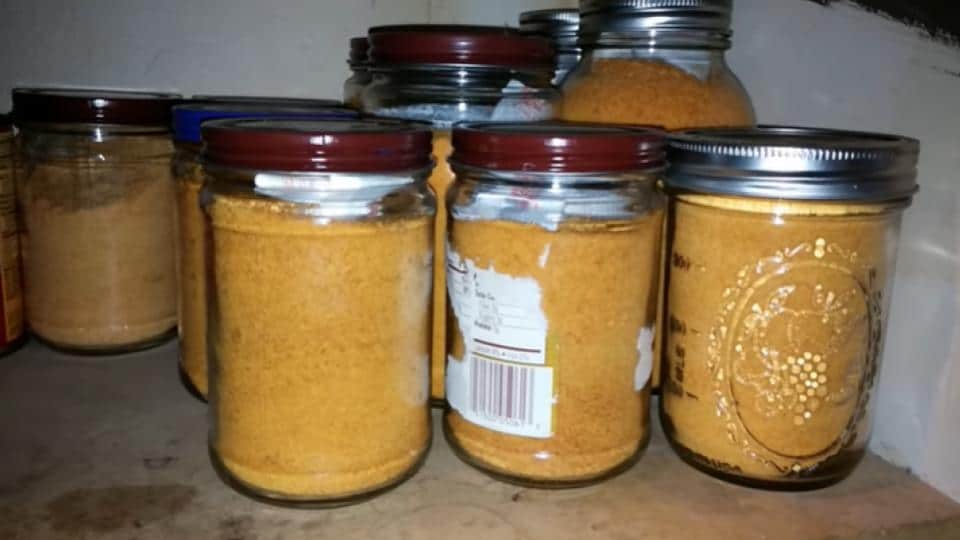How Long Do Powdered Eggs Last? And How Do You Keep Them Fresh Longer?

Table
of
Contents
Powdered
eggs
can
save
your
life.
It
is
easy
to
prepare
and
nutritious,
making
it
an
excellent
option
for
survival
food.
Not
to
mention,
it
also
has
a
long
shelf
life.
Many
of
you
are
probably
curious
–
how
long
do
powdered
eggs
last?
Like
with
other
survival
foods,
the
shelf
life
of
powdered
eggs
depends
on
several
factors.
For
instance,
proper
handling
and
storage
can
significantly
make
it
longer-lasting.
Read
on
to
find
out
how
long
exactly
powdered
eggs
are
good
for.
We’ll
also
share
some
tips
on
how
to
keep
them
fresh
longer.
How
Long
Do
Powdered
Eggs
Last?

On
average,
powdered
eggs
will
last
anywhere
from
five
to
10
years.
Some
are
even
claiming
that
it
can
last
longer
than
15
years,
provided
that
it
is
in
an
ideal
location.
Storing
it
in
a
cool
and
dark
place
will
extend
its
shelf
life.
There
is
no
need
for
refrigeration,
as
long
as
it
is
not
yet
opened.
Similar
to
other
dehydrated
dairy
products,
it
is
prone
to
spoilage
in
the
absence
of
proper
handling.
More
about
its
proper
storage
will
be
discussed
later.
How
It
Compares
to
Other
Egg
Products
Of
all
the
types
of
eggs,
powdered
eggs
are
the
ones
with
the
longest
shelf
life.
Whole
eggs
can
last
only
up
to
three
weeks
from
the
time
that
you
put
them
in
the
refrigerator.
Hard-boiled
eggs,
meanwhile,
will
last
up
to
a
week
in
the
fridge.
Meanwhile,
raw
egg
whites
and
yolks
will
only
last
three
weeks.

For
eggs
that
you
bring
camping,
they
will
not
last
more
than
a
week
because
of
the
absence
of
a
fridge.
It
is
best
to
cook
them
before
you
leave
your
house
to
prevent
the
shell
from
breaking
while
also
making
it
easier
to
last
longer.
What
Is
a
Powdered
Egg?
Powdered
eggs
are
fully
dehydrated
eggs.
Most
of
them
are
made
through
spray
drying,
which
is
the
same
procedure
for
making
powdered
milk.
As
early
as
1912,
it
has
already
made
appearances
in
popular
literature,
with
most
of
its
earliest
applications
being
camp
cooking.
Meanwhile,
in
the
United
Kingdom,
powdered
eggs
were
used
as
rations
during
World
War
II.
Popular
amongst
survivalists,
hikers,
preppers,
and
campers,
powdered
eggs
have
many
uses.
You
can
use
it
in
everyday
cooking
as
a
substitute
for
regular
eggs.
From
scrambled
eggs
to
omelets,
you
can
experiment
with
different
recipes
using
powdered
eggs.
If
you
are
thinking
of
buying
powdered
eggs,
take
note
that
it
is
available
in
three
types.
You
can
choose
from
whole
egg
powder,
egg
yolk
powder,
and
egg
white
powder.
Many
are
mixed
with
other
ingredients,
including
sugar,
flour,
and
salt,
which
can
add
flavor
to
the
powdered
eggs
when
cooked.
Benefits
of
Powdered
Egg

Not
convinced
that
powdered
eggs
should
be
essential
for
backpacking
or
camping?
Below
are
some
of
the
benefits
that
might
make
you
change
your
mind.
Long
Shelf
Life
This
is
the
biggest
benefit
of
using
powdered
eggs,
especially
when
you
compare
it
to
regular
eggs.
You
do
not
even
need
to
refrigerate
it
to
last
a
long
time,
making
it
ideal
for
the
outdoors.
As
mentioned
above,
it
can
last
five
to
ten
years
with
proper
storage.
As
long
as
you
store
it
in
a
cool
and
dark
place,
it
can
withstand
the
test
of
time.
Nutritious
Powdered
eggs
can
provide
the
nutrition
that
you
need
even
if
they
are
not
real
eggs.
On
average,
it
can
provide
up
to
13%
of
your
daily
recommended
calcium
intake.
Plus,
every
serving
contains
approximately
21.07
grams
of
protein.
This
is
almost
half
of
the
recommended
daily
protein
intake
of
50
to
65
grams
per
day.
It
is
also
a
great
source
of
minerals
that
are
necessary
for
your
daily
diet.
For
instance,
it
contains
481
milligrams
of
sodium
and
286
grams
of
potassium.
You
don’t
have
to
feel
guilty
when
eating
powdered
eggs
because
they
are
low
in
calories.
One
serving
only
has
357
calories,
which
is
roughly
equal
to
one
egg.
Nonetheless,
powdered
eggs
do
not
contain
vitamins.
Portable

Whether
you
are
hiking,
camping,
or
even
just
traveling
by
car,
bringing
eggs
can
be
a
hassle.
They
have
fragile
shells,
so
careful
handling
is
a
must.
Otherwise,
you
will
end
up
wasting
them.
One
of
the
best
things
about
powdered
eggs
is
that
they
are
portable.
They
are
lightweight
and
in
powdered
form,
so
you
don’t
have
to
worry
that
they
will
break.
Even
if
you
are
moving
a
lot,
the
powdered
eggs
will
stay
safe
and
sound
in
a
container.
Minimal
Risk
of
Contamination
Another
good
thing
about
powdered
eggs
is
that
they
reduce
the
risk
of
contamination.
It
is
less
prone
to
infestation
of
bacteria
compared
to
raw
eggs,
provided
that
you
store
and
handle
it
with
care.
Easy
to
Use
Cooking
powdered
eggs
is
quick
and
easy,
even
if
you
are
not
a
pro
in
the
kitchen.
You
can
enjoy
versatile
recipes.
It
is
also
mess-free,
unlike
eggs
that
can
be
sticky
and
dirty
during
preparation.
Signs
That
Powdered
Egg
Has
Gone
Bad
Do
not
be
left
guessing
if
your
powdered
egg
is
still
safe
for
consumption
or
not.
Below
are
some
of
the
things
to
look
for.
-
Watch
out
for
discoloration.
Once
powdered
eggs
go
bad,
it
will
darken.
You
will
notice
that
it
is
turning
yellowish
or
brownish
once
it
is
past
its
shelf
life. -
The
texture
will
also
change.
When
it
is
in
good
condition,
it
is
soft
and
powdery,
similar
to
flour.
However,
if
it
goes
bad,
it
will
have
clumps.
The
powder
will
turn
sticky
and
inconsistent. -
An
unpleasant
smell
is
another
indication
that
the
powdered
egg
is
no
longer
in
a
good
condition.
If
it
smells
sour
or
off,
discard
it
immediately. -
You
can
also
test
the
freshness
of
powdered
eggs
in
a
bowl
with
water.
If
they
sink,
then
it
means
that
it
is
still
good.
On
the
other
hand,
once
it
floats,
it
has
gone
bad.
Making
Powdered
Egg
Last
Longer
Proper
storage
and
handling
are
important
to
retain
the
freshness
of
powdered
eggs
over
time.
Below
are
some
of
the
best
things
to
do.
-
Separate
the
powdered
eggs
in
small
batches.
This
way,
you
will
only
be
touching
what
you
will
use
for
the
day.
This
can
prevent
cross-contamination. -
Store
in
an
air-tight
or
sealed
container.
This
will
prevent
oxygen
penetration,
which
can
ruin
the
quality
of
the
powdered
eggs
over
time. -
If
possible,
keep
it
in
a
hard
container.
If
you
store
it
in
a
plastic
bag,
even
the
slightest
pricks
can
create
a
mess. -
Keep
the
powdered
eggs
in
a
cool
and
dry
place.
Heat
and
humidity
can
speed
up
its
spoilage. -
Adding
an
oxygen
absorber
in
the
container
with
powdered
eggs
will
help
extend
its
shelf
life.
It
has
iron
powder
that
will
prevent
oxidation.
This
will
minimize
the
possibility
of
having
moisture
in
the
container.
Also,
find
out
how
to
store
fresh
eggs
long
term.
Conclusion
How
long
do
powder
eggs
last?
Powdered
eggs
can
last
five
to
10
years.
This
egg
substitute
will
remain
fresh
even
if
it
is
not
in
the
fridge.
Nonetheless,
pay
attention
to
proper
storage,
such
as
by
keeping
it
in
an
airtight
container
and
storing
it
in
a
cool
and
dry
place.
